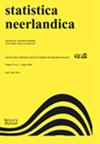Semiparametric Recovery of Central Dimension Reduction Space with Nonignorable Nonresponse
IF 0.8
3区 数学
Q2 STATISTICS & PROBABILITY
引用次数: 0
Abstract
Sufficient dimension reduction (SDR) methods are effective tools for handling high dimensional data. Classical SDR methods are developed under the assumption that the data are completely observed. When the data are incomplete due to missing values, SDR has only been considered when the data are randomly missing, but not when they are non‐ignorably missing, which is arguably more difficult to handle due to the missing values' dependence on the reasons they are missing. The purpose of this paper is to fill this void. We propose an intuitive, easy‐to‐implement SDR estimator based on a semiparametric propensity score function for response data with non‐ignorable missing values. We refer to it as the dimension reduction‐based imputed estimator. We establish the theoretical properties of this estimator and examine its empirical performance via an extensive numerical study on real and simulated data. As well, we compare the performance of our proposed dimension reduction‐based imputed estimator with two competing estimators, including the fusion refined estimator and cumulative slicing estimator. A distinguishing feature of our method is that it requires no validation sample. The SDR theory developed in this paper is a non‐trivial extension of the existing literature, due to the technical challenges posed by non‐ignorable missingness. All the technical proofs of the theorems are given in the Online Supplementary Material.This article is protected by copyright. All rights reserved.具有不可忽略非响应的中心降维空间半参数恢复
充分降维方法是处理高维数据的有效工具。经典的SDR方法是在完全观测数据的假设下发展起来的。当数据由于缺失值而不完整时,SDR只在数据随机缺失时被考虑,而在数据不可忽略缺失时则不被考虑,由于缺失值依赖于它们缺失的原因,这可以说是更难以处理。本文的目的就是填补这一空白。我们提出了一个直观的,易于实现的基于半参数倾向评分函数的SDR估计器,用于具有不可忽略缺失值的响应数据。我们将其称为基于降维的估算估计器。我们建立了该估计器的理论性质,并通过对真实和模拟数据的广泛数值研究来检验其经验性能。此外,我们还比较了我们提出的基于降维的估计器与两种竞争估计器的性能,包括融合改进估计器和累积切片估计器。我们的方法的一个显著特征是它不需要验证样本。由于不可忽视的缺失所带来的技术挑战,本文中发展的SDR理论是对现有文献的非平凡扩展。所有这些定理的技术证明都在在线补充材料中给出。这篇文章受版权保护。版权所有。
本文章由计算机程序翻译,如有差异,请以英文原文为准。
求助全文
约1分钟内获得全文
求助全文
来源期刊

Statistica Neerlandica
数学-统计学与概率论
CiteScore
2.60
自引率
6.70%
发文量
26
审稿时长
>12 weeks
期刊介绍:
Statistica Neerlandica has been the journal of the Netherlands Society for Statistics and Operations Research since 1946. It covers all areas of statistics, from theoretical to applied, with a special emphasis on mathematical statistics, statistics for the behavioural sciences and biostatistics. This wide scope is reflected by the expertise of the journal’s editors representing these areas. The diverse editorial board is committed to a fast and fair reviewing process, and will judge submissions on quality, correctness, relevance and originality. Statistica Neerlandica encourages transparency and reproducibility, and offers online resources to make data, code, simulation results and other additional materials publicly available.
 求助内容:
求助内容: 应助结果提醒方式:
应助结果提醒方式:


